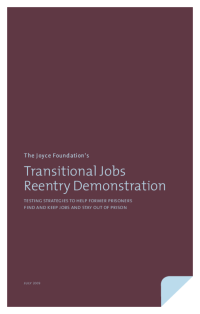The Joyce Foundation’s Transitional Jobs Reentry Demonstration
Testing Strategies to Help Former Prisoners Find and Keep Jobs and Stay Out of Prison
The number of people incarcerated in the U.S. has more than quadrupled in the last three decades. Today, more than 2 million people are incarcerated in federal and state prisons and local jails, and almost 700,000 people are released from state prisons each year. Corrections costs exceed $65 billion per year, with most of this total borne by state and local governments.
Men and women released from prison often face daunting obstacles as they move back to their communities. They frequently have difficulties finding jobs and housing, and experience problems reconnecting with family and other social supports. In addition, former prisoners are concentrated in a relatively small number of distressed urban neighborhoods that lack resources to assist in the reentry process. Not surprisingly, many end up returning to prison, a disastrous result for them, their families and communities, taxpayers, and public safety.
Prisoner reentry has attracted increasing attention in recent years, as states seek ways to reduce recidivism and control surging corrections costs. While most experts believe that stable employment is critical to a successful transition from prison to the community, there is little hard evidence about which program practices are effective at promoting successful transitions or reducing recidivism.
This policy brief describes an ongoing initiative, the Joyce Foundation’s Transitional Jobs Reentry Demonstration, that seeks to learn what works best to help former prisoners make a successful transition back into society.
What Is the Transitional Jobs Reentry Demonstration and Why Is It Significant?
A number of states have launched multi-faceted prisoner reentry initiatives — often with a strong emphasis on helping people find jobs after they leave prison — and the federal government has provided special funding to support these efforts, most recently through the Second Chance Act of 2008. Unfortunately, however, there is very little rigorous evidence about which strategies are effective at helping former prisoners find and keep jobs.
The Transitional Jobs Reentry Demonstration (TJRD) seeks to help fill this gap in our knowledge by testing innovative employment programs for former prisoners in Chicago, Detroit, Milwaukee, and St. Paul using a rigorous, random-assignment research design. In each city, one employment program is built around transitional jobs (TJ) — temporary, subsidized jobs that provide participants with a source of legitimate income, support services, and work experience as they return to the community. The transitional jobs programs in the study are being evaluated against a second set of simpler, less expensive programs called “job search” (JS) assistance programs that help participants look for work but do not provide subsidized jobs.
Ultimately, the study’s goal is to determine whether transitional jobs programs are an effective strategy for increasing employment and reducing recidivism among men recently released from prison. The TJRD project is one of the largest and most rigorous evaluations of employment programs for former prisoners since the 1970s. The results, available in mid-2010, should provide solid evidence about the effectiveness of transitional jobs, which will inform both public policy and program practice at the federal, state, and local levels.
The TJRD project was developed by the Chicago-based Joyce Foundation, whose mission includes reducing poverty and violence in the Great Lakes region. The project is also supported by the JEHT Foundation and the U.S. Department of Labor. The funders are supporting both the employment programs and a careful evaluation being conducted by MDRC, along with the Urban Institute and the University of Michigan’s Gerald R. Ford School of Public Policy. The National Transitional Jobs Network is providing technical assistance to the project.






